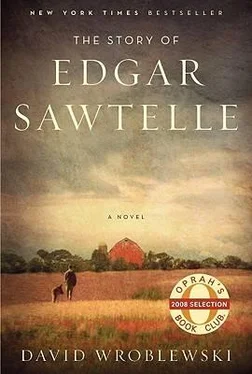“They got so they limped around behind Pop wherever he went,” Glen said.
Claude had forgotten some of the details, but as they’d drank and talked, he’d gone from grinning to laughing out loud at Glen’s recollection.
“Yup. What I remember best is him setting them on the receptionist’s counter,” Claude said, “and talking to people as if he couldn’t see them. ‘What duck?’ he’d say. I used to fall down laughing when he did that.”
Glen remembered that, too. That was back when Claude had worked around the shop doing odd jobs. He remembered thinking back then what a striking figure Claude was-a bit of a hero to Glen, in fact. He’d been athletic. (He still looked good for-what, forty?) And another thing: Claude always seemed to have a girlfriend, which, even back when he was eight, Glen suspected might turn out to be a problem for him.
“Did I ever tell you what he did at the diner?” Glen said.
“What’s that?”
“One time, when the splints were off and he knew those ducks would do just about anything for him, he put one in an old medicine bag and closed it up and we went to the diner for lunch. He set the bag on the seat in the booth and waited. The duck never made a sound. Pop ordered first, and while the waitress was taking my order, he reached over and opened the bag and out popped the duck’s head.”
“No,” Claude said, laughing.
“When I finished, he said, ‘Aren’t you going to take his order?’ and she saw the duck and screamed.”
“No.”
“Yes! Dropped her order pad and everything. And do you know what the duck did?”
“What?”
“It jumped out of the case and chased her back to the kitchen, gabbling at her heels. She hollered the whole way.”
Claude was shaking and holding onto the rim of the bar as if he were about to fall off his stool.
“Pop shouted back that his friend wanted the smelt.”
“Oh, God.”
“He said he wouldn’t put the duck back into the bag until it was done eating, that even ducks had a right to a decent lunch. Especially in Mellen.”
“Stop,” Claude begged. “Please. Stop.” Tears were streaming down his face.
Glen liked being able to make Claude laugh like that. He hadn’t quite realized what a funny story it made, but Claude had really given himself over to mirth, and Glen found it impossible not to laugh along with him. When Claude finally wiped his eyes, he ordered another round and they clanked their glasses.
“To Page.”
“To Pop.”
“What ever happened to those ducks?”
“I don’t remember,” Glen confessed. “They never could fly again. I think Pop gave them to a farmer down by Prentice.”
They watched the game for a bit longer and then Glen bought a six-pack to go and they headed for the shop. Claude followed in his Impala. Glen walked up to the dark side door and pulled out of a set of keys, drunkenly trying one after another. Inside, he flipped a switch and a bank of unearthly fluorescents flickered into service overhead. The pharmacy was nothing more than a neatly organized closet beside his pop’s office. Glen unlocked it, swung the door open, and stepped back.
“What were you looking for?”
Claude stepped inside and carefully examined the shelves of bottles and vials, pausing two or three times to look at labels more closely, almost as if window-shopping rather than just looking for the penicillin. When he had finished his detailed scrutiny of the pharmacy’s contents, he pulled three containers from the rack. “This,” he said, handing one across to Glen. “This. And this.” He stepped out and let Glen shut the door. “If you know where the sales slips are, I’ll write these up,” he said.
“Take ’em. It’d cost more to tell the lawyer than to just give them to you.”
“Well, thanks,” Claude said. “Maybe I can find a way to make it up to you.”
“No need,” he said, waving a broad hand at Claude. “Forget it.”
They walked outside and locked up and walked to the cars. Glen reached into the back seat and pulled out two beers and they stood looking into the night sky. Then the silence turned clumsy. Glen knew Claude had more on his mind than just medication. The fact was, Glen had been in touch with Claude and Trudy quite a lot over the last two months. The night his father had died, Edgar had run off with a couple of the dogs. It was more than the kid could take, seeing two men die in the same room. At first they thought he was hiding in the woods. Then they expected to spot him hitchhiking. That’s what happened to most kids who ran off. Each morning, the Highway Patrol broadcast a list of runaways picked up, but there was never a match. Of course, Glen had worked the grapevine around Mellen: Walt Graves, who delivered RFD mail, made a point to talk to everyone on his route; at the telephone office, Glen had hinted that the switchboard operators might place an anonymous call if they heard something interesting on a party line. The Forest Service had briefly run a search plane. But in the end, Edgar was just another runaway, and there wasn’t much to do except wait for him to turn up, then ship him home.
And so, without being asked, Glen said, “You know I’d call right off if something came through.”
Claude sipped his beer in silence and looked thoughtful.
“Most runaways-the ones that aren’t trying to get away from some sort of bad situation, at least-come home on their own before it gets cold. He’ll either get picked up or show up.”
“Yup,” Claude said. And then, after a while, “Just between you and me, though, I’m not sure that would be such a good thing. Maybe he’s better off run away. You can’t imagine the torment that boy has put Trudy through in the last nine months. He’s got something in him…well, he’s wild.”
“He’s getting to be that age. Plus, he must have been awfully shook up about Gar. When I talked with him, he couldn’t remember much of what happened.”
That got Claude’s attention. “Trudy mentioned that, too,” he said. “How did that work, anyway? Did he recall anything about the day at all? Or was it just a pure blank?”
“Oh, sure. Lots of stuff. What he was doing with the dogs, what he ate for breakfast. But the closer we got to the moment he found Gar, the sketchier things got.”
“Uh-huh,” Claude said. Now he was peering at Glen intently. “I always thought that was strange, the way he just…found him. I haven’t wanted to ask Trudy about it, stir up bad feelings. But are you telling me he didn’t hear anything? Gar calling for help, the dogs barking, anything like that?”
“Not when we talked. That was the next day. Technically, I should have talked with him right away, but Pop got a little mad when I suggested it. He was sure it could wait, and I could see for myself the kid was a wreck.” Glen shrugged and took another swallow of beer. “Could be different now, though. People remember things after a while.”
“I suppose,” Claude said. “But how would you know those memories are for real, you get them months later?”
Glen thought about Claude saying Edgar had something wild in him. He looked over at Claude.
“If I recall the rumors, you were pretty wild yourself once. Maybe it just runs in the family.”
Claude nodded. “I had my moments. Not so much at his age, but I know what you’re saying. I don’t fault him for wildness. But with Edgar, it’s different.”
Glen looked at him. “Different how?”
“Well, I got wild the way most boys get wild-I wanted to shake things up. I thought everything needed shaking up. I never set out to hurt anybody. With Edgar, though…I don’t know. He can’t always control his temper.”
Then Claude stopped. He looked like he was searching for words. He took a long swallow of beer.
Читать дальше
Конец ознакомительного отрывка
Купить книгу












